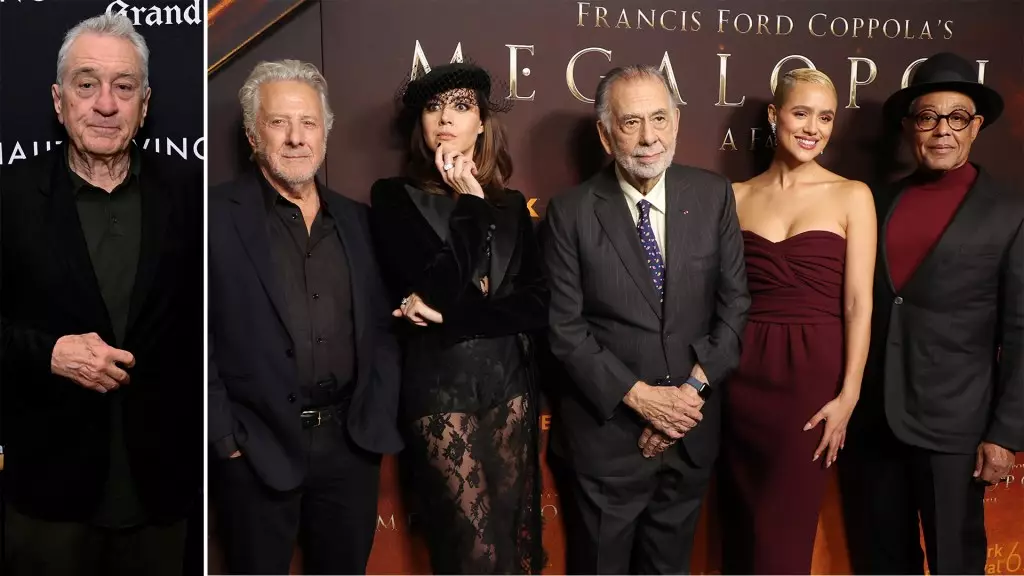In a world where the lines between art and politics often intertwine, the recent premiere of Francis Ford Coppola’s highly anticipated film, *Megalopolis*, saw legendary actors Robert De Niro and Spike Lee engage in a thought-provoking discussion that ventured far beyond the typical film discourse. Their reflections touched on cultural anxieties, the state of American democracy, and the unsettling parallel between cinematic narratives and real-life political figures, most notably Donald Trump.
At the film’s New York premiere, De Niro’s dry humor provided a sharp contrast to his austere demeanor. By suggesting an absurd scenario where Trump directs *Megalopolis*, he effectively highlighted the chaos he perceives in American politics. “He cannot do anything. He cannot hold anything together,” De Niro remarked, articulating a frustration shared by many in an era marked by political disarray. This rhetorical device served not merely to entertain but to provoke deeper contemplation about leadership and vision, offering a moment of levity amid serious discourse.
The audience’s laughter in response to De Niro’s quip signals a collective recognition of the absurdity that has permeated contemporary politics. De Niro’s ability to deliver such critiques while maintaining a straight face signifies the gravity he places on the issue, transforming a laugh into a moment of reflection. Ultimately, it was a reminder of how humor can be used as a lens to examine and critique societal issues, encouraging the audience to look beyond the surface of comedy to understand the underlying commentary on governance and responsibility.
The Q&A that followed the screening, featuring Coppola, De Niro, and Lee, proved to be a fertile ground for discussing the intersection of cinema and political commentary. As Coppola reflected on historical cycles of civilization and the rise of autocrats, De Niro seized the opportunity to voice his concerns about political stagnation and regression. His exhortation to “get out there and vote” speaks to a critical moment, where influential figures in Hollywood leverage their platform to incite civic engagement and action among their audience.
Lee echoed De Niro’s sentiments, illustrating the essential nature of participation in the democratic process. “This election is going to be very, very close,” he noted, underlining the importance of not underestimating the electoral landscape. His remarks did not just aim to galvanize the audience; they served as a rallying cry to confront complacency, emphasizing that the fight for democracy is an ongoing endeavor. Lee’s reference to sports analogies reflects a broader cultural narrative in America, where elections, much like sporting events, require both strategic insight and unwavering commitment to achieve victory.
Coppola’s acknowledgment of casting actors with differing political affiliations within *Megalopolis* like Jon Voight subtly underscores an essential theme: the complexity of human connections amid political divergence. By championing dialogue and understanding—even with individuals who hold opposing views—Coppola encapsulates the film’s larger message about the importance of coexistence and mutual respect in a polarized society.
This theme resonates deeply within the context of the broader cultural landscape, where polarization can stifle constructive discourse. The willingness to engage with differing perspectives on a film set exemplifies how cinema can act as a unifying force, fostering conversations that challenge our beliefs and expand our understanding of one another as individuals.
The path to bringing *Megalopolis* to fruition has been a long and arduous journey for Coppola, one characterized by passion, experimentation, and a relentless pursuit of creative vision. The filmmaker’s decision to finance the $120 million project himself is emblematic of his commitment to realizing the artistic endeavor on his terms. Against the backdrop of the film industry’s ever-changing dynamics, Coppola’s dedication invites consideration not only of individual artistry but also of the intricate and often precarious relationship between creativity and commerce.
The mixed reviews from the film’s premiere at Cannes further complicate its reception. The divergence in critical opinions speaks to the ongoing evolution of cinema as an art form capable of pushing boundaries and raising contentious conversations. In a time when audiences are increasingly polarized, the ambition of a project like *Megalopolis* exemplifies how cinema can serve as a mirror reflecting society’s complexities, while also offering a space for dialogue and introspection.
The discussions surrounding *Megalopolis* and its premiere highlight the critical role of cinema in responding to contemporary societal issues. Through humor, political engagement, and an unwavering commitment to artistic vision, De Niro, Lee, and Coppola not only enrich the film’s narrative but also contribute meaningfully to the ongoing discourse on democracy and the power of storytelling. As the audience leaves the theater, they are encouraged to carry with them the insights gleaned from the film and the discussions that ensued—provoked to think critically about their role in shaping the future.


Leave a Reply